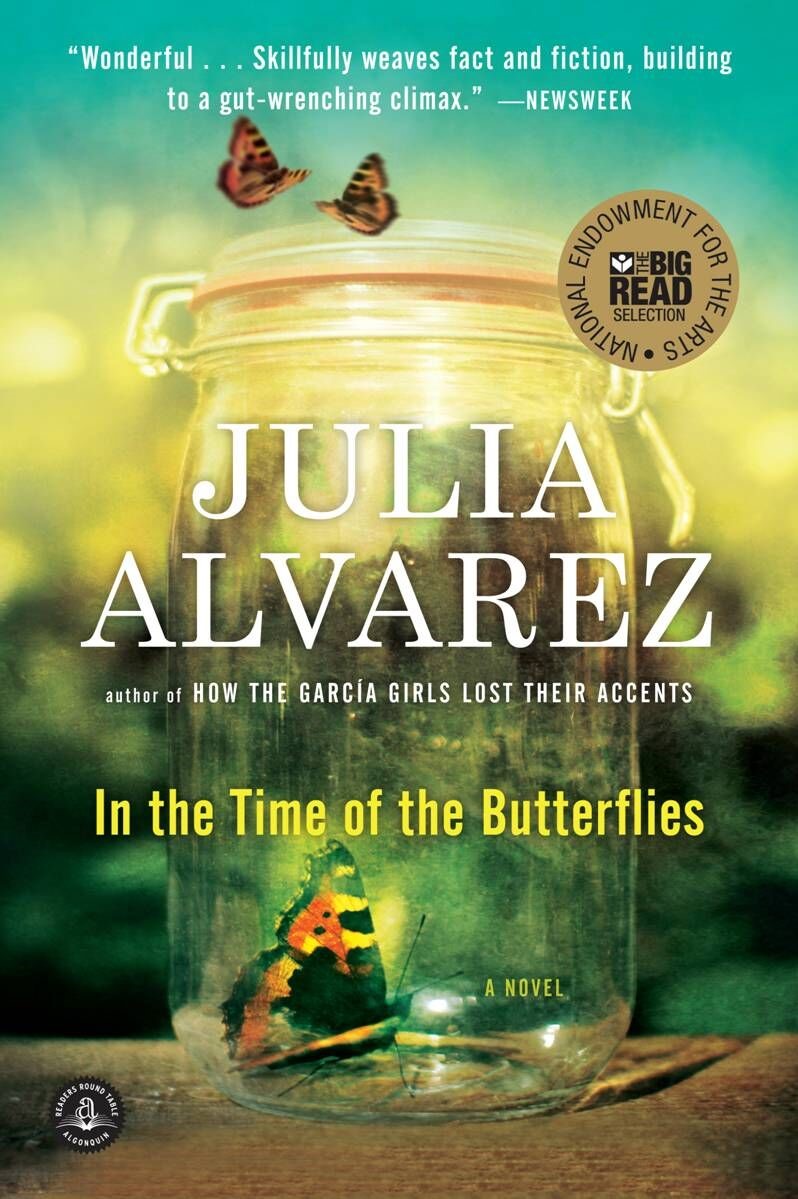A high school Contemporary Heritage book
Based on a true story, this novel is set in the mid-1900s Dominican Republic during the reign of the dictator Rafael Leonidas Trujillo and revolves around 4 Mirabal sisters, who work to free their country. Three of them, Minerva, Patria, and Maria Teresa, were killed by his secret police on November 25, 1960. The fourth, Dedé, was not with them and is portrayed throughout the book as a woman telling the story of the others to a reporter who resembles the author.
The four sisters grew up in Salcedo province, in Ojo de Agua. Patria, the eldest, is shown as a religious character, who evolves throughout the book as she loses her faith with the death of her third child, then regains it in a new fashion during a pilgrimage. Dedé, the second daughter, is weaker than her sisters and was prevented from joining her sisters' revolution by her husband, which is why she survived them. Minerva, the third eldest, is the most headstrong and courage of the four, leading two of her sisters into the revolution. Maria Teresa, or Mate, is the youngest, and she evolves as well, going from always admiring Minerva to realizing that she can choose her own path.
Growing up, the reader can see how the girls felt about the dictator. The people of the Dominican Republic are led to believe that Trujillo is "the Benefactor", equal to God. So much so that when Minerva first hears about Trujillo killing those who oppose him, she compares it to Jesus slapping a baby. Over time, she sees the atrocities that he has committed and becomes rather outspoken. Patria leads the life of a stereotypical woman, considering becoming a nun until she meets Pedrito, and marries him, building her house upon a solid foundation with the belief that her life would be stable. Mate, being the youngest, is portrayed as frivolous, wondering about boys and clothes and such. We don't really see much of Dedé, just her as an older woman speaking to the reporter.
After the four graduate out of school, Patria goes through her difficult time after the loss of her third baby. One day, a man named Lio Morales shows up at the family store. He is a university professor and is well-liked by both Dedé and Minerva. It turns out that he is actually a revolutionary, and Minerva gets deeply involved in an underground movement with him. When he escapes the country to seek asylum, however, both Dedé and her father intercept his letters to Minerva, which she finds out when it is much too late.
Minerva's father has become a wealthy man off of his farm, and since his wife feels too old to go to formal parties held by the state, he takes Minerva with him instead, and she draws his eye. When he makes unwanted advances, she slaps him, setting off a chain of events. Her father is arrested for several months, and he dies soon after his release. After that, the family business quickly goes downhill. Minerva goes off to the University to become a lawyer, meeting a fellow revolutionary named Manolo in the process, whom she later marries. Minerva follows suit, accidentally becoming involved in the revolution when she meets Leandro while he is dropping off a package of weapons (she marries him).
Meanwhile, Patria allows her sisters and their group to use Pedrito's farm as a meeting place but doesn't get involved until she sees the horrors of Trujillo's regime on a spiritual retreat. She and Pedrito, along with their firstborn Nelson, join the revolution as well.
During this time, Dedé has gotten married to her cousin, Jaimito, who evolves over time to become a dominant husband with occasional lapses of remorse. When he prevents her from joining her sisters, she is stuck in a limbo between wanting to join but not quite having the willpower to leave Jaimito and her children. Before she can make her choice, everything falls apart. First, the husbands of all the sisters are arrested. Then, Minerva and Mate are taken as well. The remaining family members work to get them back. Patria manages to get Nelson pardoned on account of his young age, but the girls are not pardoned. While they are in prison, Minerva leads a movement to keep the political prisoners motivated. Less than a year into their sentence, Trujillo's power begins to falter. The OAS finds him guilty of human rights abuses and imposes sanctions on the Dominican Republic. The Mirabal sisters are released and put under house arrest in an attempt to look good, but their trials are not over.
Every time they visit the men in prison, they sound defeated, saying that prisoners are being killed every night. Around the time of the murder of the girls, their husbands are transferred to a prison that is high up a mountain. It is on that road that the sisters are murdered, and their cars pushed off a cliff in a cover-up. The remainder of the novel describes Dedé preparing her sisters for burial and learning what happened bit by bit. Afterward, she can't move on, always dwelling on the past.
30 years later, she meets Lío at a commemoration of her sisters, and finally comes to terms with the past.

No comments:
Post a Comment